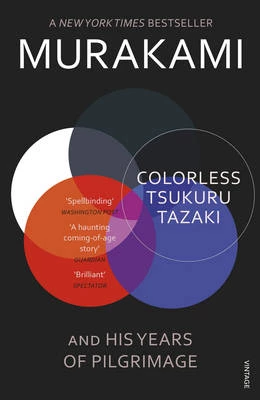
The premise of Colorless Tsukuru Tazaki is irresistible. Tsukuru’s highschool group of friends suddenly cut him off for no apparent reason. In his late 30s, he decides to find out why.
I rarely buy a book on impulse, but this time, curiosity took the best of me.
Being exiled from the tribe is one of the worst non-physical punishments someone can suffer. So, what did Tsukuru do to deserve this?
While reading, I really needed the answer — it was like a ticking bomb and the only way to diffuse it was by getting to the end of the book. No wonder Murakami sells so well. He knows how to keep you glued.
Despite a few plot holes and a strange detour that doesn’t go anywhere (except a very graphic sex scene), the story builds up well until the dots connect at the very end, making Colorless a pretty engaging read.
Murakami explores topics of fleeting friendship, loneliness, and self-worth.
One of the saddest things in life is that most friendships inevitably end. With time, inseparable friends can become indifferent strangers. Distance, work, kids, marriage, changing interests; all conspire to dismantle even the most robust friendships. Life follows its course and the friendship withers, like an old and tired body that no longer has the will to live.
Relationships have become disposable, like something you use for some time, and when the new shiny toy effect wears off, throw away.
But relationships are like a living organism. If you do not dedicate an effort to keep them alive, they die. That circle of friends, that epicenter of happiness from one’s youth, without which you can’t imagine your life, will eventually cease to exist if you do not make an effort.
However Tsukuru was cut off intentionally. And this drives him almost mad. His life goes by in a hypnosis of melancholic mundanity, incapable of forming human connections.
His only hope is a woman he just met. But she is hiding something…but she is hiding something that could completely destroy Tsukuru.
Memorable Passages From Colorless Tsukuru Tazaki
“When my father was young, he spent a year wandering around Japan,” Haida began. “This was at the end of the 1960s, the peak of the counterculture era, when the student movement was upending universities. I don’t know all the details, but when he was in college in Tokyo, a lot of stupid things happened, and he got fed up with politics and left the movement. He took a leave of absence from school and wandered around the country. He did odd jobs to earn a living, read books when he had the time, met all sorts of people, and gained a lot of real-life, practical experience. My father says this was the happiest time of his life, when he learned some important lessons. When I was a kid, he used to tell me stories from those days, like an old soldier reminiscing about long-ago battles in some far-off place. After those bohemian days, he went back to college, and returned to academic life. He never went on a long trip ever again. As far as I know, he’s spent his time since just shuttling back and forth between home and his office. It’s strange, isn’t it? No matter how quiet and conformist a person’s life seems, there’s always a time in the past when they reached an impasse. A time when they went a little crazy. I guess people need that sort of stage in their lives.”
“The world isn’t that easily turned upside down, Haida replied. It’s people who are turned upside down.”
“Talent can be a nice thing to have sometimes. You look good, attract attention, and if you’re lucky, you make some money. Women flock to you. In that sense, having talent’s preferable to having none. But talent only functions when it’s supported by a tough, unyielding physical and mental focus. All it takes is one screw in your brain to come loose and fall off, or some connection in your body to break down, and your concentration vanishes, like the dew at dawn.
“Aren’t you afraid of dying? Not really. I’ve watched lots of good-for-nothing, worthless people die, and if people like that can do it, then I should be able to handle it.”
“That night, several strange things happened.”
“As long as you work for somebody you have to put up with a lot of crap.”
“The economy’s still in pretty bad shape, of course, but the rich manage to hold on to their money. Amazingly well.”
“When I was with them, I felt like an indispensable part of the whole. It was a special feeling that I could never get anywhere else.”
“Still, being able to feel pain was good, he thought. It’s when you can’t even feel pain anymore that you’re in real trouble.”
“Vacations and friends are the two best things in life.”
“All the beautiful possibilities we had then have been swallowed up in the flow of time.”
“The right words always seemed to come too late.”
Write a Comment
Deep